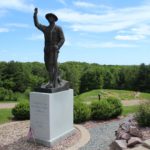Life Members
World War I Veterans Ray Fuller and John Herteau are proud to be
still among the age-old fellowship of those who served their country.
By: Frank Smoot
         The sporty, sparkling white sedan turned into The Highground a little faster than most cars, stopped perhaps a bit abruptly, clearly meaning business. The driver, wearing a ball cap and golf shirt, got out and quick as a wink was on the passenger’s side. He helped his passenger out of the car: 96-year-old World War I veteran Ray Fuller had arrived to sign the contract for the “Doughboy†WWI memorial.
         Fuller was the driver —- his younger friend, John Herteau, the passenger.
         After making introductions, Fuller race-walked up to the Vietnam statue at the far end of the memorial plaza, returning a few moments later to ask about placement of the WWI statue, the depth of the footing, the timetable leading up to its dedication. Between his duties for various veteran’s organizations and his three bowling leagues per week (he has an average in the mid 150’s), Fuller was taking a lead role in assuring the dedication would be successful. Along with their many other duties, Fuller and Herteau helped organize three motor coaches to the dedication, two from Oshkosh and one from Waupaca.
         Their business done, at least for this cool August day, Fuller and Herteau sat at a picnic table on the plaza and talked about World War I, its veterans both here and gone, and the support they’re found among their younger compatriots.
         “Us World War I veterans,†says Fuller, “we aren’t like some of the other organizations that look down on the Vietnam Veterans: we work with them. After all, we’re all veterans. That’s why my cap says, ‘USA Veteran.’ The Vietnam Veterans, we look up to them as much as to anybody else. You betcha.â€
         Fuller, who’s been alive long enough to know veterans from each war between the Civil War and Desert Storm, has learned that the experience of war transcends the decades, the continents, and the reasons for fighting. A special point of pride for him is the position of honor younger veterans have awarded his generation. “We’ve got some good friends down at the Wisconsin Board of Veteran’s Affairs. They treat us like kings when we go down there. I don’t care who’s in that audience or anything, we’re introduced. They make a point to introduce us.â€
         As their numbers thin, the veterans of the “war to end all wars†are especially heartened to see that their contributions are still remembered. Says Herteau, who served in the Navy on the U.S.S. Louisiana, “Well, you just stop and figure, out of four and three-quarters million who were in World War I, today that is down to 58,000 as of the first of last month. That’s less than 2 percent.†He pauses and then says with a smile, “Ray and I happen to be the only two men who are capable of traveling around and trying to keep the organization together.â€
         Fuller concurs. “It’s an up-hill battle. But we keep going. We have a convention each year, such as it is. We fill our offices. Sometimes we have to call the guys who can’t make it and ask them to take a title and fill the office.â€
         The men, both from the Oshkosh area, gather up the WWI troops regularly, along with as many members of the families as want to come. “We try to get together once a month. We change around from one restaurant to another.â€
         “About eight years ago,†adds Herteau, “we started working with the auxiliary. We have dinner meetings and we have them all together. Right now, we’re down to six members in our barracks. One of those members doesn’t attend meetings, because he lives in Georgia now. And we have four auxiliary ladies —- no, three. So, all we can have now is a meeting of eight.â€
         As needed, Herteau and Fuller help get their fellow veterans out and about. “We’ve got some of the membership that can’t get there on their own,†says Fuller. “In fact, I pick up two of ‘em. One other always tells me he’s coming but he never gets there. He always says he’ll try, but he’s getting awfully weak, just barely gets around now.
         “One guy’s blind as a bat, but he comes. He lives all alone —- all alone—- has strings overhead in his house that he put up or someone put up for him. He gets a hold of that string and follows it wherever he wants to go. Independent, doesn’t want your help.â€
         Herteau also helps provide the taxi service. “I used to pick up three members,’ he says. “Today, I only pick up one, and that’s in the last three years. I’m the youngest one, and I was 94, July first.â€
         These gatherings of old friends aren’t about “Veteran’s affairs†anymore in any real sense of the phrase. Explains Fuller, “It’s just for the sociability. As far as business is concerned, we have nothing really. Just to hang together, that’s all.â€
         Fuller’s even managed to get himself out of collecting dues. “Everybody put their money in to be a life member. That’s how we keep going. Besides,†he laughs, “that way it’s less work for me.â€
“Some things I wish I could forgetâ€
      As Fuller tells it, he may well have survived the war by being shot. Although that might strike some ears as peculiar, comments like it are fairly common among veterans. An ill or wounded soldier, of course, is both alive and out of the action. Says Fuller, with the hearty laugh that only decades of time and distance can afford, “I practically spent more time in the hospital and in the convalescent camps than I did in the field.â€
     Now 96, Fuller was just out of his teens when World War I was declared. But he was already a veteran of 10 months when he was called up. “I enlisted in June of 1916, served on the Mexican border until February, then came home. War was declared then in April. I was called back into Guard duty then, right at home. That was under the Wisconsin National Guard —- we’d been sworn out of the Federal and back into the National.
     “In June we went to Camp Douglas again for training, then we went to Waco, Texas. We built that camp: There was nothing there when we went in. After we built it —- the mess halls and all that —- then we started training, even had French instructors.
     “We left Texas in the latter part of January —- this is 1918 now —- and went overseas. Spent 21 days on the George Washington, and landed at Brest, France; then it was hike, ride the box cars, kept getting closer to the front all the time. We’d be in one place maybe two or three weeks. Finally, we got up to the front.â€
     But even though Fuller and his mates were near the French-German border, his unit didn’t see much action for months: unlike later wars in this century, WWI was not without its strange conventions of civility. “This was trench warfare,†explains Fuller, “but we were in a ‘quiet sector’ in Alsace-Lorraine. They didn’t want any shooting in there, because Germany wanted the land in there and so did the French, so they didn’t want it shot up. So, it was training. Nights, they went on patrols then back in. Then in the daytime, we had outposts. You had to go out through the barbed wire and be stationed at that outpost during the day.
     “I remember one time, I was at an outpost with one of my buddies there, and one of the Germans showed up and almost got shot. The instructor —- I don’t know how he got out there so fast —- he got out through the barbed wire and said, ‘Oh, no, don’t shoot. They shoot back.â€
     It was nearly seven months from the time Fuller left Texas until his unit saw active combat. “We sat there until June, then we started up to a different sector. We’d hike for a day or two, then get on some box cars and ride for a while. And maybe we’d load up the next day and ride some more. So, then we went up through Chateau Thierry, this is the end of July now, and we kept advancing a little bit each day. As the front moved, we’d move, although we were back in reserves.
     “The first time we saw action, the front line had been trying to take this woods all day long, and we kept moving up, and every time they’d fall back, we’d retreat. Late in the afternoon, we got in there, got shipped up into the front line —- they’d lost a lot of men in there. Well, we were firing and this and that, when finally, somebody hollered, ‘Retreat!’ But our captain, he was a hell of a swell guy, a beautiful guy, he said, ‘Retreat, hell! B-company stand!’ Well they did; every man respected him. All he had to do was say this, and that was it.
     “So, we went on and we took the woods that night. There was some hand-to-hand fighting in there; I didn’t get into real hand-to-hand, but I was up in there. We took a couple of prisoners. We were all scattered out around the woods, didn’t know where anyone was, because it was dark when we got in there. We just lay down wherever we could.
     “In the morning, they brought a little breakfast for us, such as it was, and then we started off. That’s when I got hit, so I went back. Went to the First Aid station there, and I said, ‘No, I want to go back to the outfit.’ ‘No, you’re getting out of here.’ They were coming in so fast, they couldn’t do anything. They just gave me a shot in the arm, that was all. The bandage I put on.â€
     From the front, Fuller was shipped to a field hospital at Chateau Thierry, and then a few hours later was loaded on a train and went to Paris. After a few days in Paris, he was taken far from the front, all the way to Bordeaux. After spending the bulk of late summer convalescing, he started the same frustrating, lurch-and-halt journey to the front as he’d experienced when he first landed at Brest nearly a year before. By this time, the German army was retreating. “When we got up to the lines —- oh, there were three or four days when I got some of it, not much. They were retreating then; all we were doing is trying to keep up, let them know we were there. I was with them only a couple of days when the same thing happened; I went back to the hospital again. So, I went through one convalescent camp, one after another after another.â€
     It’s said that a Civil War soldier’s entire report from Gettysburg was this: “We all went up to Gettysburg the summer of ’63. And some of us came back from there. And that’s all except the details.â€
     Fuller, like many veterans, has never talked much about his war experiences, and it seemed clear he hoped only that his brief account would maybe strike a chord about the importance (and the frustrations) of doing one’ part to help his country. As he said, before he turned to other matters, “I never have talked too much about my experience over there. . . . I lost one brother. He was in the detached service. It’s nice to remember some things, but some things I wish I could forget.â€

